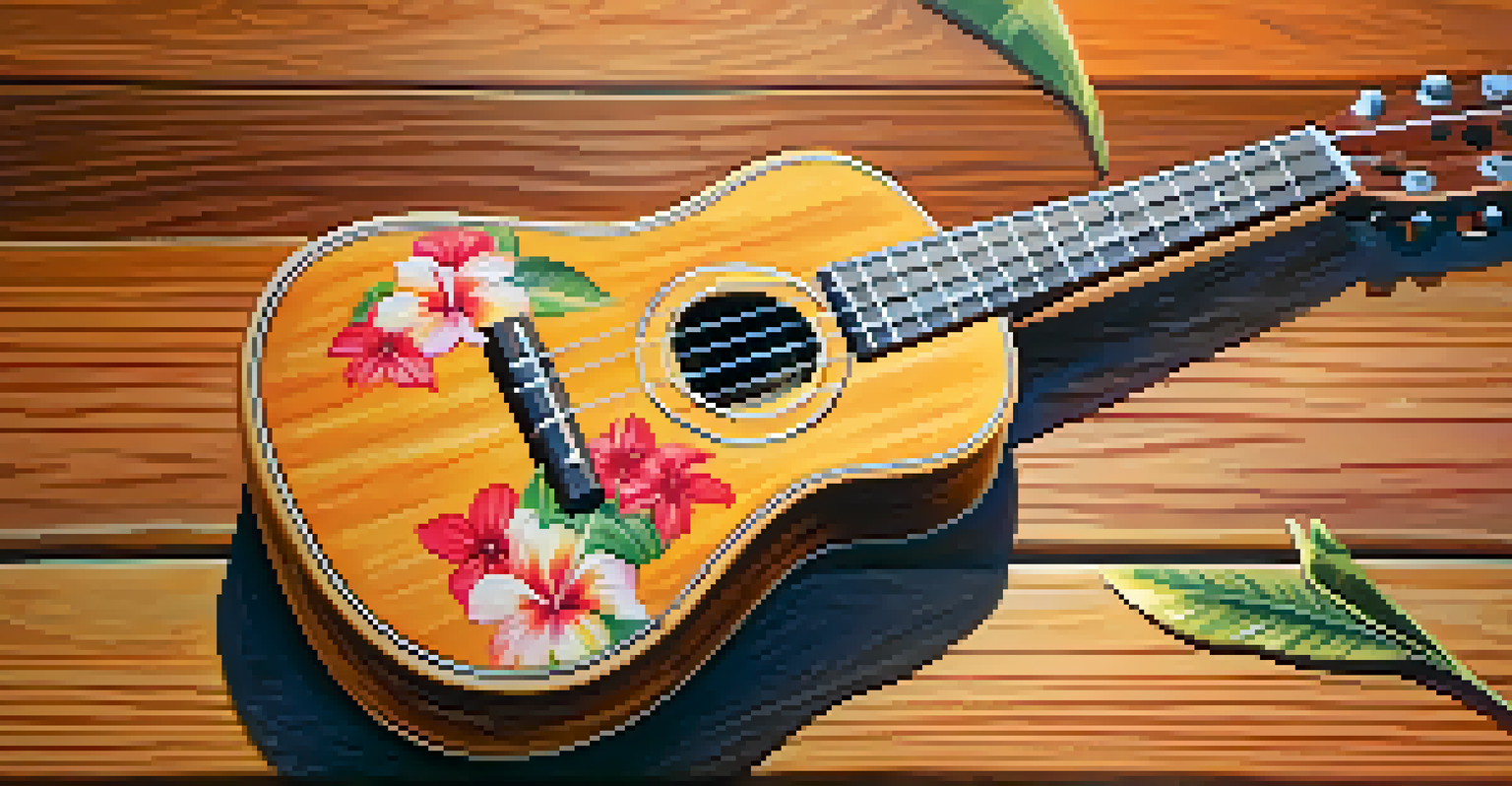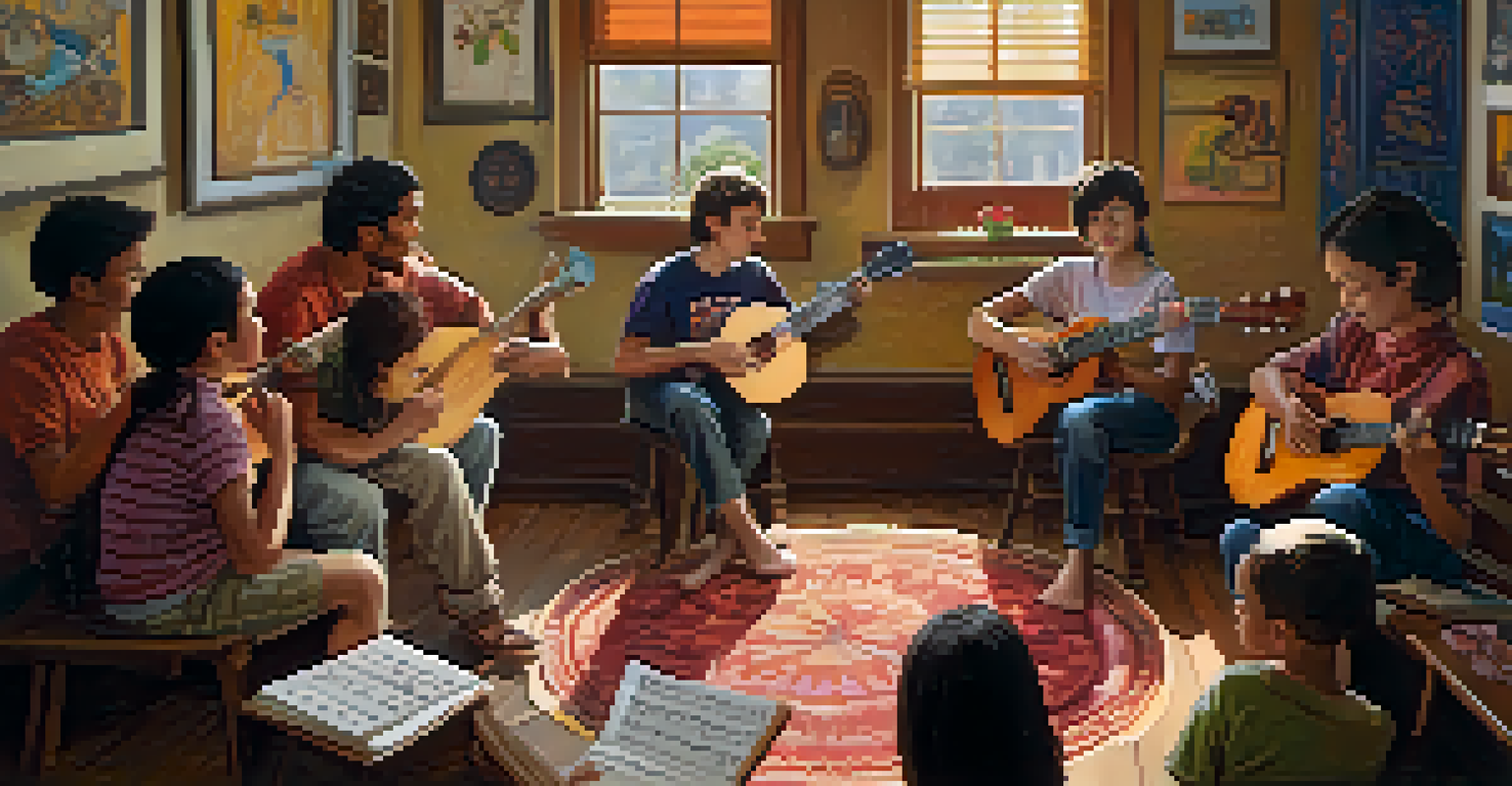The Ukulele's Influence on Hawaiian Folk Music Traditions

A Brief History of the Ukulele in Hawaii
The ukulele, a small guitar-like instrument, was introduced to Hawaii in the late 19th century by Portuguese immigrants. Its cheerful sound quickly captured the hearts of locals, blending seamlessly with existing Hawaiian musical traditions. As it evolved, the ukulele became a symbol of Hawaiian culture and identity, playing a central role in folk music.
The ukulele is the happiest instrument in the world.
Initially, the instrument was used mainly in rural areas, but its popularity surged during the early 20th century. This rise coincided with the emergence of Hawaiian music on the mainland United States, showcasing the ukulele’s charm to a broader audience. Soon, it was featured in popular performances, making it a staple in Hawaiian folk music.
Today, the ukulele is recognized worldwide, often associated with the warm, inviting spirit of Hawaii. It serves as a bridge between cultures, allowing people from different backgrounds to connect through music. The instrument’s journey reflects the vibrant history of Hawaii itself, celebrating diversity and creativity.
The Ukulele's Role in Traditional Hawaiian Music
In traditional Hawaiian music, the ukulele complements vocals and other instruments, creating a harmonious soundscape. Its unique timbre adds a layer of warmth and joy to folk songs that tell stories of the islands, nature, and the Hawaiian way of life. This interplay is crucial for preserving the rich oral history of Hawaiian culture.

Moreover, the ukulele's portability makes it a favorite for community gatherings and hula performances. Its cheerful melodies resonate during celebrations, evoking a sense of togetherness and joy. This accessibility encourages people of all ages to participate, ensuring the continuation of these beloved traditions.
Ukulele's Cultural Impact in Hawaii
The ukulele symbolizes Hawaiian identity and community, reflecting the spirit of aloha through music.
As a result, the ukulele has become more than just an instrument; it’s a vital part of Hawaiian identity. It symbolizes the spirit of aloha, inviting everyone to share in the joy of music. This role reinforces the importance of community in Hawaiian folk traditions, creating lasting memories through shared experiences.
Influence on Contemporary Hawaiian Musicians
Contemporary Hawaiian musicians often incorporate the ukulele into their work, blending traditional sounds with modern genres. Artists like Israel Kamakawiwoʻole have popularized this fusion, creating music that resonates with both locals and global audiences. Their songs often highlight the ukulele's versatility, showcasing its ability to adapt to various musical styles.
Music is the universal language of mankind.
Moreover, the ukulele has inspired a new generation of musicians to explore Hawaiian folk music. Many young artists are learning to play, creating their own interpretations of traditional songs while infusing fresh ideas. This revitalization helps keep Hawaiian music alive and relevant in today’s music scene.
The resurgence of interest in the ukulele has also led to a boom in music festivals and workshops. These events celebrate Hawaiian culture while encouraging collaboration among musicians. By fostering a sense of community, the ukulele continues to play a crucial role in shaping the future of Hawaiian music.
Cultural Significance of the Ukulele
The ukulele holds deep cultural significance in Hawaii, representing more than just a musical instrument. It embodies the spirit of aloha, emphasizing love, compassion, and connection among people. This cultural value transcends music, permeating everyday life in Hawaii and beyond.
Additionally, the ukulele serves as a symbol of resilience and adaptation, reflecting the history of the Hawaiian people. Just as the instrument has evolved and incorporated various influences, so too has Hawaiian culture. This dynamic nature fosters a sense of pride and belonging within the community.
Influence on Modern Hawaiian Music
Contemporary musicians blend traditional ukulele sounds with modern genres, keeping Hawaiian music vibrant and relevant.
In educational settings, the ukulele is often used to teach Hawaiian history and music. Schools incorporate it into their curriculum, helping students connect with their heritage. By doing so, they ensure that future generations appreciate the ukulele’s role in Hawaiian culture and continue to pass down these traditions.
The Ukulele in Hawaiian Festivals and Events
Festivals across Hawaii often showcase the ukulele, celebrating its importance in local culture. Events like the Honolulu Festival and the Ukulele Festival Hawaii bring together musicians from all backgrounds to perform and share their love for the instrument. These gatherings create an atmosphere of unity and joy, where attendees can enjoy live music and learn from one another.
During these festivals, attendees can participate in workshops, learning to play the ukulele and engage with the music firsthand. This hands-on experience fosters a deeper appreciation for the instrument and its cultural significance. It encourages a sense of community and connection, as people come together to celebrate their shared love for music.
Furthermore, the presence of the ukulele at such events highlights its role in preserving Hawaiian folk traditions. As musicians perform both traditional and contemporary songs, they keep the spirit of aloha alive. This ongoing celebration ensures that the ukulele's influence continues to resonate, bridging the gap between generations.
Global Influence of the Ukulele
The ukulele's charm has transcended Hawaiian shores, influencing music worldwide. Musicians from various genres have embraced the instrument, incorporating it into their work and introducing it to new audiences. This global reach has helped spread the joy of Hawaiian folk music, fostering appreciation for its unique sound.
As the ukulele gains popularity, it has also sparked a growing community of enthusiasts. Online platforms and social media have facilitated connections among players, inspiring collaborations and sharing of techniques. This collective enthusiasm has contributed to a vibrant ukulele culture, with a plethora of resources available for learners.
Global Reach of the Ukulele
The ukulele has transcended its Hawaiian roots, inspiring a global community and fostering cultural exchange through music.
Moreover, global events like the Ukulele Underground and international ukulele festivals celebrate this instrument's widespread appeal. These gatherings showcase talent from around the world, promoting cultural exchange and understanding through music. The ukulele, once a symbol of Hawaiian identity, has now become a beloved instrument for many, uniting people through its uplifting melodies.
Preserving the Legacy of the Ukulele
Efforts to preserve the legacy of the ukulele are evident in various educational initiatives across Hawaii. Music programs in schools aim to teach students about Hawaiian history and the significance of the ukulele. These programs play a vital role in ensuring that future generations understand and appreciate their cultural heritage.
Additionally, local organizations are dedicated to promoting the ukulele and its role in Hawaiian culture. They host events, workshops, and competitions, encouraging participation and engagement within the community. These efforts create a sense of pride and ownership, reminding everyone of the instrument's rich history.

As the world continues to change, the commitment to preserving the ukulele’s legacy remains strong. By fostering a love for music and cultural education, Hawaiians ensure that this cherished instrument will continue to thrive. The ukulele will forever hold a special place in the hearts of those who embrace its joyful spirit.